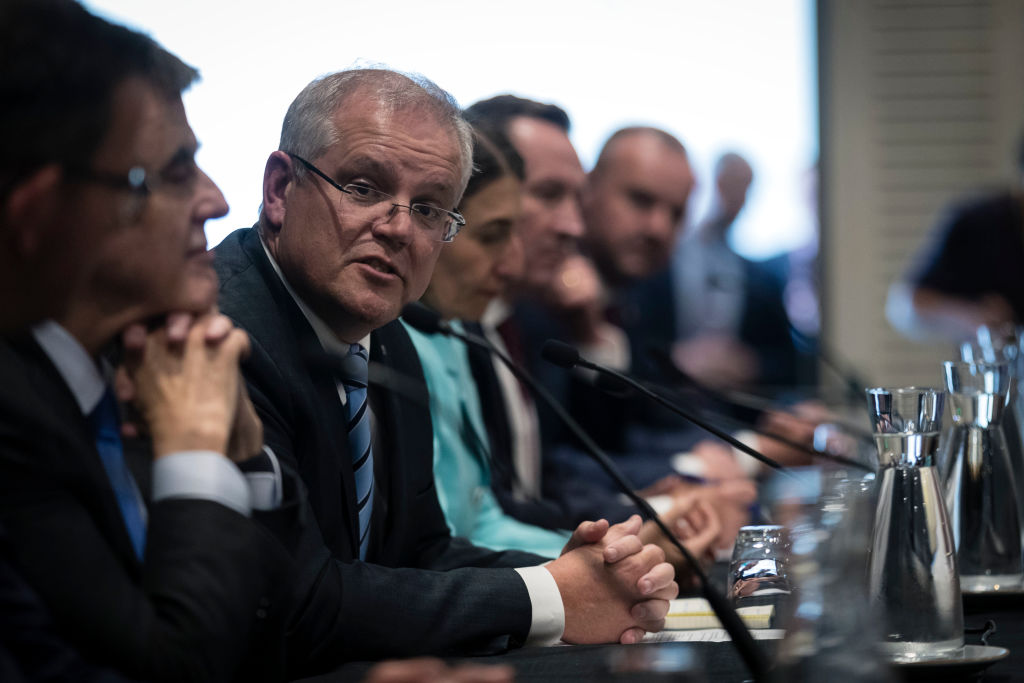Morrison is closing the seams in our federation that China seeks to exploit

Prime Minister Scott Morrison’s proposed foreign relations bill is all about closing the seams in our federation and giving practical effect to the Commonwealth’s constitutional power on foreign relations. It’s necessary primarily because other countries are exploiting the gaps between our federal, state, territory and local governments to Australia’s disadvantage.
The new law is also necessary because the current informal consultation on foreign policy matters between states and the Commonwealth just isn’t working. We can see the problem graphically with Victoria. Victoria has signed up to Xi Jinping’s controversial Belt and Road Initiative, a move Premier Daniel Andrews defended by saying, ‘I’m not going to apologise for a trade policy that is all about growing Victorian jobs.’
In contrast, the federal government recognises the national security and foreign policy danger in Australian states joining an initiative designed to build China’s strategic, technological and economic power over others. Right now, with Beijing using trade as a weapon against Australia, this concern looks well placed.
If Francis Fukuyama had been right back in 1992 with his ‘end of history’ thesis, nation-states would have receded into the background as we all entered a post–Cold War liberal international nirvana. But this globalist vision got mugged by the return of national power, particularly as practised by the authoritarian People’s Republic of China. And Covid-19 has further reinforced the value of cohesive national action, led by countries’ central governments.
Inverting Fukuyama, powerful countries can use global connections, technology and relationships to reach into others’ domestic economies and politics to interfere with and influence national policy and to gain advantage. The People’s Republic of China does this both openly and through coercive and corrupting means, and has arms of government devoted to it, led by its United Front Work Department.
From Beijing’s perspective, the seam between governments in Australia is a perfect place to put a wedge—and work at the level of the states and territories to achieve what Beijing cannot at the federal level. Collecting a few state governments to participate in the BRI, for example, would put pressure on Canberra to change its policy. And if it doesn’t, it becomes irrelevant because of the economic heft of big states such as Victoria and New South Wales. The fact that only the federal government has the agencies and horsepower to properly assess the national security implications of such decisions makes this easier.
It’s a similar story with local governments and public universities. The partnerships they enter into with foreign governments can have deep consequences for our national security, as we see with the leaching of our universities’ intellectual property to China’s People’s Liberation Army and internal security apparatus through research partnerships and the Thousand Talents Plan.
China is the textbook case of a national regime that sets foreign policy which is then implemented by its provincial governments and through its large state-owned corporations, military, security agencies and state universities. There are no seams that can be exploited there. Other states, such as Israel and Singapore, are also well organised and cohesive—to their advantage, and often to ours because of alignment with our interests and values.
The Chinese Ministry of Foreign Affairs may well express outrage at the proposed law, while being quietly disappointed that Australia will simply be preventing China from doing here what Beijing would never allow others to do within its jurisdiction. Provincial governments in China could not strike deals with Australia, for instance, without Beijing’s approval.
So, the protective side of the government’s foreign relations legislation would end arrangements that are against Australia’s interests. The public register proposed under it will provide the transparency to allow this. Many arrangements with many governments will simply proceed unchanged because they make sense.
There’s a less obvious but very positive side of the proposed law, which is also a consequence of this improved transparency. The register will allow us to see connections and possibilities across different levels of government and our universities that we can actively exploit to our and our foreign partners’ advantage. It will let us make policy and operational connections that we may otherwise have missed, whether that’s about reinforcing a priority research partnership or seeing new economic and trade opportunities.
The new law needs to be debated in the federal parliament, but there’s no doubt that closing the seams in our federation and seeing new opportunities across our myriad international partnerships are both in Australia’s national interest.